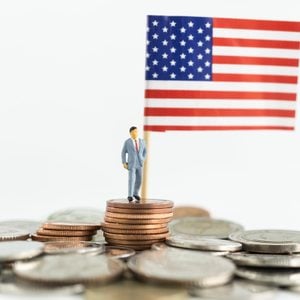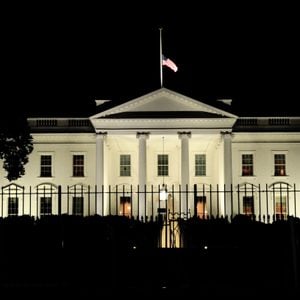Dick Cheney Was One of the Most Influential—and Polarizing—U.S. Vice Presidents in History, and These 14 Facts Explain His Legacy
Former Vice President Dick Cheney, who died on Nov. 3 at age 84, will be remembered for his strong political convictions, hawkish policies in two Middle Eastern wars and effective partnership as vice president to George W. Bush. Born in Lincoln, Nebraska, and raised in Wyoming, Cheney was a staunch conservative whose trajectory took him from local politics to Washington (and back again) to the second-highest office in the country.
Serving the father-son duo of Bush presidents, Cheney directed the course of both the Persian Gulf War under President George H.W. Bush and later the Iraq War under President George W. Bush. His influence on military policy and the direction of the presidency was so powerful that some regarded him as a Machiavellian, behind-the-scenes maneuverer—a sly mover and shaker who knew how to make things happen in politics.
But Cheney was also a devoted family man, marrying his high school sweetheart and supporting his two grown daughters. He also never forgot his rural roots, epitomizing the Wyoming frontier spirit with his trademark cowboy hat.
Although he was a controversial figure during his tenure in the White House, he’s now regarded as something of a stalwart figure for traditional conservatism following his very vocal criticism of the direction the Republican Party has taken in recent years. However, there’s no doubt he was one of the most significant, consequential politicians of the late 20th and early 21st centuries.
We searched the web for the best news articles and videos for additional context on Cheney, including his history in politics, little-known facts about his life and his influence on the course of recent American history. Read on to learn more.
Get Reader’s Digest’s Read Up newsletter for more history, humor, cleaning, travel, tech and fun facts all week long.
He was the youngest White House chief of staff in history
Cheney began his federal public service in Washington in 1968. He held several assistant positions before being tapped for White House chief of staff under President Gerald Ford in 1975. At age 34, he was the youngest person to ever hold the position.
Discovered on The New York Times
He represented his home state of Wyoming
After leading Ford’s unsuccessful bid for reelection as campaign manager, Cheney returned to his roots. In 1978, he was elected to the House of Representatives as Wyoming’s lone congressman, remaining in the position for 10 years.
Discovered on Biographical Directory of the United States Congress
He headed the Department of Defense for the elder President Bush

Cheney served as Secretary of Defense under President George H.W. Bush and began the job on March 21, 1989. His most critical role was in the successful Persian Gulf War of 1991, in which the military campaign Operation Desert Storm successfully drove back Iraqi forces under Saddam Hussein after they invaded Kuwait and threatened U.S. interests in the area. For his leadership during the war, he received the Presidential Medal of Freedom.
Discovered on the Office of the Secretary of Defense
He was originally tapped to find George W. Bush’s VP
After the first President Bush left office, Cheney moved to the private sector, including a stint as an executive at the Halliburton Company—but he couldn’t stay away from politics for long. The former president’s son and then-presidential candidate George W. Bush asked Cheney to lead the vice presidential selection committee, which found that the best person for the job was … Cheney himself. He took the role, and the ticket won the 2000 election by an extremely close margin.
Discovered on The Miller Center at UVA

He supported enhanced interrogation techniques
After the attacks of Sept. 11, 2001, by the terrorist group al-Qaida, the CIA used enhanced interrogation techniques, including waterboarding and sleep deprivation, on captured al-Qaida and Taliban prisoners. Cheney led four briefings on the techniques to senior members of Congress in 2005 “in an effort to maintain support for the harsh techniques used on detainees.”
Discovered on The Washington Post
He lobbied for the passage of the Patriot Act
Six weeks after the Sept. 11 attacks, “Cheney played a decisive role in forcing through the passage of the USA Patriot Act.” The Patriot Act broadly expanded the powers of the executive branch “to carry out investigations and warrant-free surveillance in the name of counterterrorism.” Though the act expired in March 2020, subsequent presidents, including current President Donald Trump, have used the claim of acting in the interest of counterterrorism to justify the suppression of dissent and even the “use of force on the U.S. homeland by the dramatically expanded and empowered Immigration and Customs Enforcement (ICE) units.”
Discovered on The Guardian
He was the architect of the Iraq War
After 9/11, Cheney promoted the War on Terror and lobbied aggressively for the invasion of Iraq. “Simply stated, there is no doubt that Saddam Hussein now has weapons of mass destruction,” Cheney said in a speech in August 2002. “There is no doubt he is amassing them to use against our friends, against our allies and against us.” The U.S invaded Iraq in 2003 against objections from Secretary of State Colin Powell and others in the Bush administration. The weapons of mass destruction were never found.
Discovered on USA Today
He feared terrorists could hack his pacemaker and kill him
Throughout the course of his life, Cheney suffered five heart attacks, with the first occurring when he was only 37. Over the years, he had multiple angioplasties and catheterizations, plus a quadruple bypass operation, a defibrillator implant and ultimately a heart transplant in 2012. It was the wireless feature on the defibrillator that had his cardiologist, Jonathan Reiner, alarmed. “It seemed to me to be a bad idea for the vice president of the United States to have a device that maybe somebody on a rope line or in the next hotel room or downstairs might be able to get into—hack into,” and kill him, Reiner said on 60 Minutes in 2013. During the same interview, Cheney admitted to watching an episode of Homeland in which the fictional vice president was killed in that exact manner. “Because I knew from the experience we had and the necessity for adjusting my own device that it was an accurate portrayal of what was possible,” the former vice president said.
Discovered on CBS News
He never sought to be president
Unlike many veeps, Cheney never had his eye on the big prize and was content to be second in command—Bush relied on him completely as his most trusted advisor. However, Cheney transformed that office from a largely ceremonial and ineffective position into one with real influence and control. His knowledge of the inner workings of Washington gave him the reputation of a master of secrets and a puppet master who pulled the strings, wielding power from behind the scenes.
Discovered on AP News
After leaving office, he retired to Jackson Hole, Wyoming
After his vice presidency, Cheney moved back to his home state to enjoy the country life of an outdoorsman, with plenty of fishing and shooting. Thankfully, he never had a repeat of the 2006 incident in which he accidentally shot his friend (the friend survived, forgave him and lived to 95). Cheney called it “one of the worst days of my life.”
Discovered on USA Today
He remained unrepentant on even his most controversial stances
In 2015, Cheney co-authored Exceptional: Why the World Needs a Powerful America with his daughter Liz, a political book that’s widely seen as a rebuttal to his critics over the years. In regard to the Iraq War, he wrote, “We did the right thing in 1991 and in 2003.” As for enhanced interrogation techniques, “to call enhanced interrogation a program of torture … is to libel the dedicated professionals who saved American lives and to cast terrorists and murderers as innocent victims …”
Discovered on The Guardian
He supported his daughters

His daughter, Liz Cheney, took her father’s former place in Congress from 2017 to 2023, with the elder Cheney’s full backing. Cheney also backed marriage equality in support of his other daughter, Mary, who is gay and married her wife in 2012.
Discovered on Advocate
He was a vocal critic of Donald Trump
Cheney spoke out against Donald Trump, as has his “never Trumper” daughter Liz. He issued a statement prior to the 2024 election, saying, “there had never been an individual who is a greater threat to our republic than Donald Trump” and “he [Trump] tried to steal the last election using lies and violence to keep himself in power after the voters had rejected him. He can never be trusted with power again.” In the same statement, Cheney announced that he would be voting for Democratic candidate Kamala Harris.
Discovered on BBC
He inspired an Oscar-nominated movie
Christian Bale played Cheney in the 2018 darkly critical biopic Vice, which was nominated for eight Academy Awards—but the real Cheney did not participate in its creation. Although Bale thanked “Satan” in a Golden Globe acceptance speech, Cheney often took criticism of himself in stride, even joking about his nickname, “Darth Vader.” Today, though, those on both sides of the aisle look back on Cheney more fondly.
Discovered on The Hollywood Reporter
Why trust us
At Reader’s Digest, we’re committed to producing high-quality content by writers with expertise and experience in their field in consultation with relevant, qualified experts. We rely on reputable primary sources, including government and professional organizations and academic institutions as well as our writers’ personal experiences where appropriate. We verify all facts and data, back them with credible sourcing and revisit them over time to ensure they remain accurate and up to date. Read more about our team, our contributors and our editorial policies.
The post Dick Cheney Was One of the Most Influential—and Polarizing—U.S. Vice Presidents in History, and These 14 Facts Explain His Legacy appeared first on Reader's Digest.
from Reader's Digest https://ift.tt/M8BznIe



Comments
Post a Comment